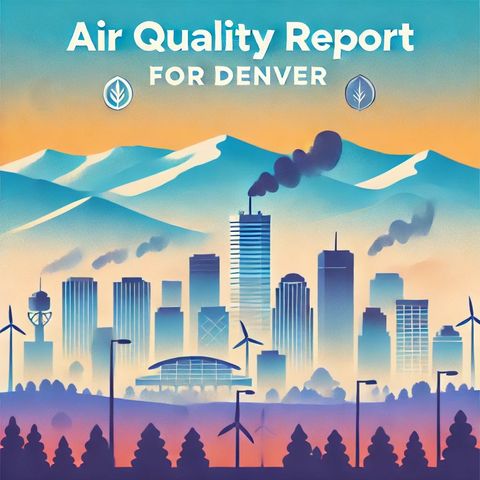Denver Grapples with Fluctuating Air Quality Amid Weather, Emissions, and Wildfire Impacts

Sign up for free
Listen to this episode and many more. Enjoy the best podcasts on Spreaker!
Download and listen anywhere
Download your favorite episodes and enjoy them, wherever you are! Sign up or log in now to access offline listening.
Denver Grapples with Fluctuating Air Quality Amid Weather, Emissions, and Wildfire Impacts
This is an automatically generated transcript. Please note that complete accuracy is not guaranteed.
Description
Today in Denver, the air quality is a subject of significant interest and concern. Denver, known for its picturesque landscapes and mountainous backdrop, is experiencing fluctuating air quality levels due...
show moreThe Air Quality Index, or AQI, is the standard measure used to report daily air quality. The AQI focuses on health effects that may be experienced within a few hours or days after breathing polluted air. It ranges from zero to 500, with lower values indicating good air quality and higher values indicating more hazardous conditions. Today's AQI in Denver is experiencing moderate levels, ranging from 51 to 100. This indicates that the air quality is generally acceptable, but there may be some concern for some individuals, particularly those who are unusually sensitive to air pollution.
One major contributor to Denver’s air quality is vehicular emissions. Denver’s urban setting, with its bustling downtown and high traffic volume, results in significant emissions of nitrogen dioxide and particulate matter. These pollutants can lead to respiratory issues, particularly in vulnerable populations such as children, the elderly, and those with pre-existing health conditions.
In recent years, wildfires have become a profound concern for air quality in Denver. Smoke from wildfires occurring in Colorado and neighboring states can travel significant distances, contributing to elevated levels of fine particulate matters known as PM2.5. These particles are small enough to penetrate the respiratory system and cause health problems. Today, wildfire smoke is contributing to the AQI levels in Denver, although not to hazardous levels.
Weather conditions also play a critical role in determining air quality. Denver's topography and weather conditions can trap pollutants close to the ground, leading to episodes of poor air quality. Currently, a temperature inversion, where a layer of warm air traps pollutants in the colder air below, is contributing to the moderate air quality readings. Without sufficient wind to disperse the pollutants, they accumulate and can exacerbate respiratory issues among the population.
Local authorities are proactive in disseminating information and providing guidance on how residents can mitigate exposure to poor air quality. The Colorado Department of Public Health and Environment regularly updates public advisories and recommendations. Today, vulnerable individuals such as children, the elderly, and those with respiratory conditions are advised to limit prolonged outdoor exertion during periods of moderate air quality.
In conclusion, while Denver continues to enjoy many days of good air quality, factors like vehicular emissions, wildfire smoke, and specific weather conditions contribute to fluctuations that residents should monitor closely. Awareness and proactive measures can help mitigate the health impacts of air quality issues, ensuring that everyone can continue to enjoy the vibrant, scenic environment that Denver offers.
Information
| Author | QP-5 |
| Organization | William Corbin |
| Website | - |
| Tags |
Copyright 2024 - Spreaker Inc. an iHeartMedia Company
